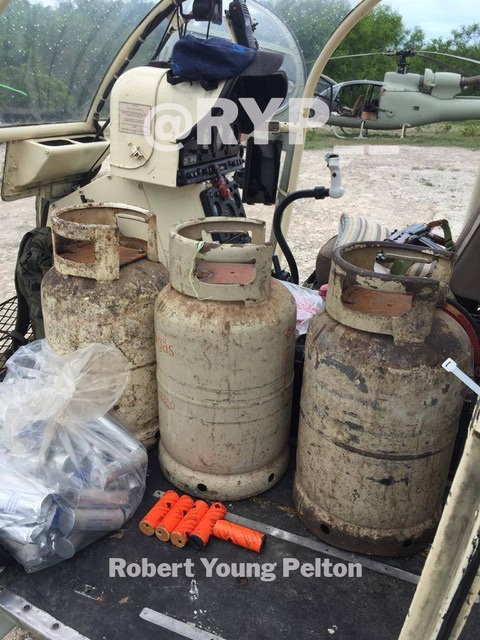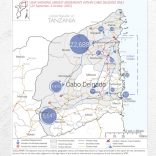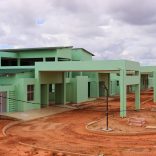Mozambique: Licungo University delivers computers under 'One Student, One Laptop' program
Mozambique: No visas for UN, Exxon postpones, war crimes, barrel bombs, Covid – By Joseph Hanlon

Picture: Voa Portugues
In this issue
Cabo Delgado
+ No visas for UN aid workers
+ Exxon postpones indefinitely
+ Amnesty cites ‘all sides’ for war crimes
+ Is DAG dropping barrel bombs?
+ Food for besieged Palma
Covid-19
+ World Bank: urban poor hit hardest
+ Vaccination starts; schools open
Cabo Delgado
- No visas for 57 UN humanitarian aid specialists
The UN has been waiting for more than four months for visas for 57 humanitarian experts for Cabo Delgado. After exhausting quiet diplomatic channels, United Nations resident coordinator in Mozambique, Myrta Kaulard, finally went public and told Lusa (5 Mar)
“We have more than 50 requests” pending, she said. The lack of humanitarian visas constitutes a “very big” limitation to the “efficiency of the humanitarian response and, in the end, it will also have implications on the willingness of partners to contribute resources” if there is “no capacity to distribute humanitarian aid”. The visas are intended for specialists to travel to Mozambique to establish systems and train local people.
Lusa says that at the end of January the average delay in visa approval was three and a half months, and apparently none have been issued since then. Materials for health, shelter or other support items were taking almost three months to be released by customs. Non-UN agencies and NGOs report similar blocks.
Comment: For more than a year, government has been trying to keep all outside observers – notably journalists, researchers and aid workers – out of the war zone. Although it continues to appeal for military and humanitarian help, government wants to retain total control of that assistance. In particular, government is trying to control the narrative, and enforce the line that this is entirely external Islamic terrorism, and that there is no one to negotiate with. Outsiders soon discover that the civil was has local roots in growing inequality and exclusion, and humanitarian aid workers find it is possible to talk to the insurgents. jh
- Exxon postpones FID indefinitely
After two previous postponements, ExxonMobil has postponed indefinitely its Final Investment Decision (FID) on the Cabo Delgado gas. Bloomberg reports that Senior Vice President Neil Chapman, during a conversation with analysts, said there is no forecast on when the FID would be made on the $30 bn Cabo Delgado project. An FID will depend on market conditions, putting the $30 billion investment in doubt, and may indicate that the project is at risk of leaving the US company’s list of priority investments, Bloomberg reported. (Lusa 4 Mar)
On 30 November Exxon said it would write down the value of its natural gas properties by $17-20 billion, and slash project spending. In October it said it would dismiss 14,000 people in the next two years.
Comment: There are two market scenarios. 1) Bankers stress that gas is a “transition” fuel, with half the carbon of coal. So in the intermediate timescale, gas demand will remain high in China and elsewhere as a fuel to replace coal for electricity generation. 2) Environmentalists stress that gas is a “fossil” fuel, like oil and coal, and there is rapidly growing pressure to stop all fossil fuels. For electricity generation, wind, solar and other fossil-free generating systems are becoming cheaper.
Over the past Covid-19 year, the environmentalists have gained the upper hand. But the bankers say that with a return to normal post-Covid-19, demand for gas will jump and remain high through the 2030s. It appears that even ExxonMobil is not sure; it has several gas projects in the queue ahead of Mozambique so Cabo Delgado has been put on hold. And the longer it is delayed, the less likely ExxonMobil will go ahead. In the end, Cabo Delgado gas could be limited to Total on Afungi and ENI’s floating LNG plant. Is the gas bubble deflating? jh
- Amnesty accuses ‘all sides’ of war crimes
Amnesty “documents violations of international humanitarian law, including war crimes, by all sides of the conflict,” in a devastating and detailed report published 2 March. It says:
+ The insurgents’ “abuses have been horrific. The group’s fighters deliberately kill civilians, burn villages and towns, and commit heinous acts of violence.”
+ “Government forces, which include the military and police, have conducted extrajudicial executions, committed acts of torture and other ill-treatment, and mutilated the bodies of their victims.”
+ Operatives of the South African private military company Dyck Advisory Group “have fired machine guns from helicopters and dropped hand grenades indiscriminately into crowds of people, failing to differentiate between civilians and military targets.”
Amnesty concludes: “The civilian residents of Cabo Delgado are caught between three fighting forces, none of which respect their protected status under international humanitarian law (the laws of war).”
The full report in English is HERE.
Insurgents: Amnesty uses the local named for the insurgent group, Al-Shabaab (simply meaning the youth), and it is not linked to similarly named groups elsewhere. “Al-Shabaab is primarily a home-grown armed group fighting over local issues, an insurgency sparked by the long-term under-investment in the Muslim-majority province by the central government. The group uses jihadist ideology as an organizing tool. … There is no evidence that Al-Shabaab is primarily composed of, or led by, foreign fighters. … The armed group remains largely a local organization, with local concerns, that has pledged loyalty to an outside umbrella group.”
“Amnesty International has found that fighters routinely kill civilians, loot their homes, and then burn them down using petrol. … These actions have been done deliberately to intimidate and frighten the population.”
The report has detailed satellite photos showing most houses and buildings burned in some towns. But pictures of Chai and Macomia in June 2020 shows the burning of houses there appears selective, with some houses burned and neighbouring ones not.
Government: “Amnesty International has found that the military and police too often breach their duties by harming citizens and unlawfully taking their property…. Residents told Amnesty International that they are subjected to constant harassment and extortion by police. … FADM soldiers also mistreat the civilian population they are deployed to protect. Witnesses said that sometimes the beatings seemed random, and the victims reported being unable to understand why security forces were taking that action. Other times, during the beatings police officers and soldiers accused the civilians of protecting Al-Shabaab. … In addition to the mistreatment of civilians, Mozambican government forces have also failed to live up to their responsibilities to protect civilians from Al-Shabaab attacks.”
In Quisanga in March and April 2020 the “Permanent Secretary’s house would come to be known to villagers as a place where government security forces took women to be raped, and men detained, beaten, and in some cases, summarily executed as well. Six witnesses described a mass grave behind the home, a ‘big hole’ under the trees, where people would be taken to be shot and dumped directly in the pit.” Amnesty names some of those executed.
DAG: “Local residents said they personally observed DAG helicopters and light aircraft direct machine gun fire at civilian infrastructure, including hospitals, schools, and homes made of mud and thatch. Thirty of those witnesses said they also observed the helicopters hand-dropping explosive ordnance out the side of the helicopters. In a broad pattern reflected in multiple engagements, witnesses consistently said the helicopters fired indiscriminately into crowds, or dropped ordnance, without distinguishing between combatants and civilians.”
Is DAG dropping Syrian-style barrel bombs?
Syrian-style barrel bombs are now being used by DAG, according to Robert Young Pelton. He reports that DAG is using improvised bombs made from cooking gas bottles. The first picture is definitely taken at the DAG base at the riot police base in Pemba, near the Pemba Beach Hotel. The photos are otherwise not verified as to dates and whether the cooking gas bottles are actually bombs. But the Amnesty report gives eye-witness reports of bombs being dropped from helicopters; in Mocímboa da Praia in late June 2020 one witness said: “Two helicopters came, one shooting and dropping bombs.”
more photos of homemade bombs and rigging from the Dyck Advisory Group. Note the “Get Some” which is a quote from Full Metal Jacket https://t.co/dW7uNHnzHq pic.twitter.com/Tdw0slQGHF
— Robert Young Pelton (@RYP__) March 2, 2021
You can note the lack of aiming devices which were a constant complaint of the pilots working the low budget job. The civilians commented on “bombs” being dropped by the mercenaries out of small helicopters. pic.twitter.com/2VqGBDqkg0
— Robert Young Pelton (@RYP__) March 2, 2021
A barrel bomb is an improvised unguided bomb, with explosives and sometimes shrapnel in a metal container, dropped from a light plane or helicopter, often over civilian areas. It was first used by the Israeli military in 1948 and then by the US in Vietnam in 1968. They have been most prominently used for the past decade by the Syrian military against opposition zones. In 2014, the United Nations Security Council unanimously adopted Resolution 2139 that demanded “that all parties immediately cease all attacks against civilians … such as the use of barrel bombs”.
- Palma still isolated but getting food
Total has moved to keep Palma supplied with food and fuel by allowing spare space on its barge from Pemba to be used for food and fuel lorries – in exchange for traders not charging high prices. Two weeks ago they carried 120 tonnes of food. Last week only 30 tonnes were moved. The hope is to transport two trucks with a total of 60 tonnes of cargo each week.
But Palma remains cut off by land and the insurgents seem deermined to maintain that. In the past two weeks there have been a series of attacks in a strip that runs 100 km along the Rovuma river from Nangade to Quionga on the coast. This has included attacks on villages around Nangade and on the now closed road to Palma, as well as on Quionga itself (where the administrative post chief was beheaded) and the Namoto border post on the river.
Qionga is only 20 km north of Palma and it is only a further 14 km to the river border post. But Quionga is 26 km north of the Afungi gas installation. Total has demanded that the government ensure a security zone 25 km out from Afungi. Quionga is just outside that. There have also been further attacks near the N380 paved road to Mocimboa da Praia. It looks increasingly like the insurgents will not challenge the 25 km radius security zone, but want to control everything outside and keep it isolated.
- Two ex-British helicopters arrive in Nacala
Two Gazelle helicopters, apparently supplied by Paramount Group and painted in green and brown camouflage used by the Mozambican Air Force on attack helicopters no longer in use, arrived at Nacala airport in February. Fifteen Mozambican pilots were trained by Paramount at Polokwane Airport in South Africa. The two are part of a batch of 30 former British Army Air Corps Gazelles acquired at auction by Paramount. More Gazelles are being prepared for export from the UK. (Defenceweb 5 Mar, Scramble 2 Mar, Africa Intelligence)
A Paramount Gazelle at the Africa Aerospace and Defence exhibition in September 2014 was fitted with the FLASH multi-platform modular mission system for helicopters which includes a stabilised sight, mission computer, mission display, weapons control panel and weapons (12.7 mm gun pod, 20 mm cannon, 70 mm rockets and Ingwe anti-tank missiles).
The government’s agreement with Paramount is said to cover at least 12 Marauder armoured vehicles and four Gazelle helicopters. Some of the Marauders were delivered in November
Covid-19
- Urban poor hit hardest
“The urban population has been hit hard” by Covid-19. “The impacts of Covid-19 on households has mainly been felt through loss of earnings and employment, especially for the poor working in the informal sector”, reports the World Bank in its latest Mozambique Economic Update, released 4 March. About 850,000 people fell into poverty in 2020. By June 120,000 jobs had been lost, and about 62,000 employment contracts had been suspended. “Job losses have undermined food security, with more than 50% of urban households reportedly running out of food.”
“The country has taken unprecedented measures to contain the spread of the virus, although at the expense of bringing the economy to near standstill,” the report notes. Growth had already “declined sharply from an average of 8% [per year] in 2001-2015 to 3% in 2016-2019. In 2020, weak global demand, low commodity prices and strict measures to contain the virus have seen trade decline and domestic consumption shrink …. In addition, oil price shocks and unfavourable financial market conditions have delayed the Mozambique Rovuma liquefied natural gas (LNG) project. As a result, real GDP is expected to decline by 0.8% this year compared to a pre-Covid estimate of 4.3%” growth.
The government has set up support programmes, including a major extension of cash transfer programmes. “The National Social Action Institute aided the 570,000 existing beneficiaries of the productive safety net program with an additional one-off payment of $50, equal to three months of regular subsidies. An additional 290,000 vulnerable households in urban and peri-urban areas were included in the Direct Social Assistance Plan. They receive a bimonthly cash transfer of $ 50 for six months, paid as an incentive to stay at home. Of these, 40,000 are informal workers, who are registered at the INSS.” The World Bank supports this and calls for a further increase in cash transfers.
But the Bank is critical of government for general failure of its poverty reduction programmes: “The pandemic is further delaying Mozambique’s already slow progress towards the Sustainable Development Goals (SDGs),” the report says.
Government has also tried to help businesses, but the World Bank is critical of “overly restrictive eligibility criteria”, “procedural bottlenecks” and that ” government support was not conditioned on the preservation of jobs.”
World Bank “Mozambique Economic Update Setting The Stage For Recovery” February 2021 in English and in Portuguese
- Vaccination starts this week
Covid-19 vaccination should start this week, with two doses of the Sinopharm vaccine, donated by China, with 21 days between the doses. The first priority will be 65,000 health professionals. Health Minister Armindo Tiago said health professionals will include gravediggers (added at the request of Maputo Municipal Council) and final year medical students.
The latest figures from COVAX indicate that Mozambique is entitled to receive slightly more than two million doses under this initiative in the near future.
After health professions, the next three groups are residents and staff at old people’s homes and nursing homes, people with diabetes, and the defence and security forces. Government hopes to vaccinate the entire adult population by the first half of 2022, covering nearly 17 million people. https://www.misau.gov.mz/index.php/plano-nacionais (AIM 6 Mar)
- Schools resume but other restrictions remain
Face-to-face classes at all educational institutions will resume Monday 8 March, President Filipe Nyusi announced in an address to the nation on 4 March. All educational institutions must observe Covid-19 prevention measures. These include regular washing of hands (which implies that schools without a reliable supply of water will be unable to re-open), social distancing (which will restrict the size of classes), and the wearing of face masks.
Training for teams playing in Mocambola, the Mozambican football championship, resume training, but the championship remains on hold.
But all other measures already in force, including the mandatory curfew from 21.00 to 04.00 for the Greater Maputo area, will be extended for another 30 days. The restrictions on the sale of alcoholic drinks remain in force. So all bars and stalls or kiosks whose main business is the sale of alcohol remain closed. Licensed bottle stores, shops and supermarkets may sell alcohol between 08.00 and 13.00 Monday to Saturday, but all sales of alcohol are banned on Sundays.
Nyusi noted that there was a problem in many places of people not wearing masks, so efforts to enforce the mandatory use of masks will be stepped up.
Nyusi’s decision comes after a meeting with doctors who warned of a more intense third wave if there was any relaxation. Maputo sports clubs were also at the meeting seeking a resumption of activities, but this was rejected.
The director of the National Institute of Health (INS) of Mozambique, Ilesh Jani, said “the relaxation of restrictive measures could result in a third wave, with even more intense transmission.” The INS director said that deaths and infections from the new coronavirus were showing “signs of stabilization” recently, after the rise registered in January – “probably due to the restrictive measures taken.”
Epidemiologist Avertino Barreto, a member part of the government’s Covid-19 Scientific and Technical Commission, said that the country should not “relax now, not even a little”. “I am of the opinion that the curfew must be maintained and, moreover, extended to other cities where the situation was believed to be under control, such as Nampula, Beira and Quelimane.” (LUSA 4 Mar)
- Cases and deaths remain high
The fall in new cases of Covid-19 since the early February peak has slowed, and is now half of the peak – but is five times the pre-Christmas levels. Deaths have remained high for three weeks, at 60% of the early February peak and six times the pre-Christmas level.
New cases of Covid-19 per week
Deaths from Covid-19 per week.
Covid-19 is still a Maputo metropolitan area disease with 78% of active cases, followed by Sofala at 7% and Cabo Delgado at 5%.
By Joseph Hanlon

















Leave a Reply
Be the First to Comment!
You must be logged in to post a comment.
You must be logged in to post a comment.